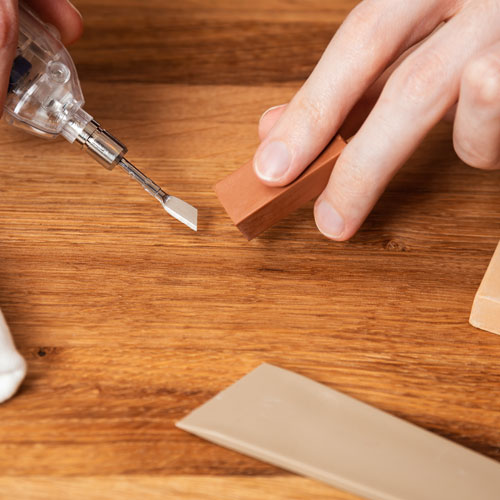Handling Stains: A Comprehensive Stain Removal Guide for Vinyl Floors
Fortunately, vinyl flooring is resilient and able to handle spills and heavy traffic with ease. Despite its waterproof surface, encountering a persistent spill is inevitable. It’s important to address any spill quickly to prevent it from staining or damaging your floors. Before you start, consult your manufacturer’s guide to ensure that the products and methods you use won’t damage your flooring or void your warranty. It’s recommended to test a small, inconspicuous area before applying any solution to your floors.

Common Stains on Vinyl Floors
Vinyl floors are susceptible to a variety of stains, ranging from everyday spills to stubborn marks and more:
- Food Stains: Spills from food and beverages are frequent culprits for staining vinyl floors. Whether it’s a splash of coffee, a dribble of wine, or a drop of sauce, these stains can leave noticeable marks if not cleaned promptly.
- Grease Stains: Grease and oil stains are particularly troublesome on vinyl floors, often resulting from cooking mishaps or spills in the kitchen. These stains can be challenging to remove due to their oily nature and tendency to penetrate the surface of the flooring.
- Pet Stains: Pet accidents can leave unsightly stains and odors on vinyl floors. The acidity and ammonia content in pet urine can cause discoloration and damage to the flooring if not addressed promptly and properly.
Certain stains are more challenging to remove than others due to factors such as the type of substance, the duration of the spill, and the porosity of the flooring material. For example, stains from highly pigmented liquids like red wine or berry juice may penetrate the surface more deeply, making them harder to remove. Understanding the nature of different stains and employing appropriate cleaning techniques can help effectively remove them without harming your vinyl floors.
Vinyl Stain Removal Tips
Common household items are typically effective at removing various stains on vinyl flooring.
- Baking Soda Paste (for general stains):
- Mix baking soda with a small amount of water to create a paste.
- Apply the paste to the stained area and let it sit for about 10-15 minutes.
- Gently scrub the area with a soft-bristled brush or sponge.
- Rinse the area thoroughly with clean water and dry it with a clean cloth.
- Vinegar Solution (for grease and food stains):
- Mix equal parts of white vinegar and water in a spray bottle.
- Spray the solution onto the stained area and let it sit for a few minutes.
- Use a damp cloth or sponge to wipe away the stain, applying gentle pressure as needed.
- Rinse the area with clean water to remove any residue and dry it thoroughly.
- Dish Soap Solution (for general stains):
- Dilute a small amount of dish soap in warm water to create a cleaning solution.
- Apply the solution to the stained area using a cloth or sponge.
- Gently scrub the stain in a circular motion, working from the outside towards the center.
- Rinse the area with clean water and dry it with a clean towel.
Stain Prevention
The best approach to stains on vinyl floors is to be proactive. Implement measures such as using mats in high-traffic areas, wiping spills promptly, using felt pads under furniture legs, and regular maintenance to preserve the floor’s appearance and minimize the need for stain removal.
Vinyl flooring is known for its easy maintenance and resistance to spills and stains. However, stains can occur despite our best efforts. With effective removal techniques, you can maintain the visual appeal of your vinyl floors.
Considering resilient vinyl flooring for your home? Contact us or visit us today at one of our South Carolina locations, located in Lexington, and Greenville, SC.

